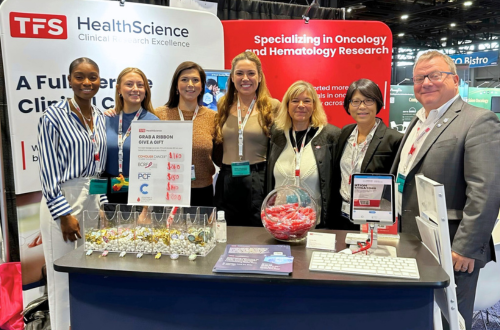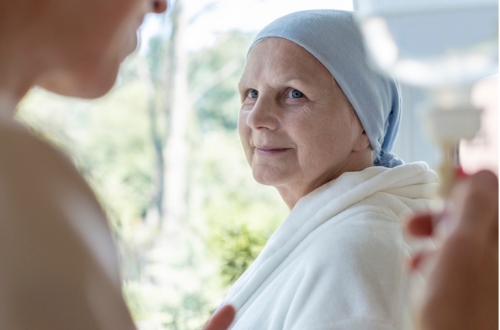Insights from ASCO (American Society of Clinical Oncology) 2024
The Annual Meeting of the American Society of Clinical Oncology (ASCO) is the largest and one of the most prestigious research gatherings in the field of clinical oncology. Each year, it serves as a platform for making connections and establishing collaborations that are transforming the landscape of cancer care. The 60th Annual Meeting, ASCO 2024, kicked off earlier this month in Chicago from May 31 to June 4, with over 40,000 clinical oncology professionals attending to discuss their groundbreaking discoveries in oncology research and novel therapeutic advances in oncology clinical trials. Notable presenters included renowned biotech and pharmaceutical companies, including AstraZeneca, AbbVie, and Bristol Myers Squibb, as well as researchers from the American Cancer Society, the University of Chicago Medicine Comprehensive Cancer Center, and more.
This year’s ASCO Presidential theme was ‘The Art and Science of Cancer Care: From Comfort to Cure’, which emphasized the shift in focus from identifying targets for certain cancers to optimizing therapeutic regimens and combinations to improve cancer patients’ quality of life. Over 5,000 abstracts and 200 sessions honored this theme, attended by thousands of clinical oncology research professionals, including representatives from TFS HealthScience’s Oncology CRO (Contract Research Organization). Considering the vast amount of knowledge shared at ASCO 2024 across each of these sessions, this article aims to highlight the key insights and discussions that took place at this year’s meeting.
Read on to learn more about the latest advancements in clinical oncology!
Emerging Novel Cancer Therapies: Updates from Recent Oncology Clinical Trials
As of 2024, Spherical Insights estimates the global oncology drugs market value is projected to be worth US$565 billion by 2033, at a compound annual growth rate (CAGR) of 11.5% between 2023 and 2033. Because the average cancer drug requires nearly 10 to 15 years of development across Phase I to Phase III clinical testing, the updates provided from recent oncology clinical trials are of paramount importance for the future landscape of cancer care. For full highlights from the ASCO 2024 meeting, visit these articles from USA News Group and Labiotech.
1. Pelareorep and the GOBLET Study from Oncolytics Biotech
Oncolytics Biotech specializes in the development of innovative immunotherapies and presented two abstracts at ASCO 2024 on the efficacy of pelareorep. In the GOBLET study, combination treatment with pelareorep and modified FOLFIRINOX (folinic acid, fluorouracil, irinotecan, and oxaliplatin), with or without Roche’s atezolizumab, is being evaluated in patients with metastatic pancreatic ductal adenocarcinoma (PDAC). Previously, pelareorep, gemcitabine, nab-paclitaxel, and atezolizumab received a Fast Track designation from the Food and Drug Administration (FDA) for the treatment of advanced/metastatic pancreatic cancer. Based on this outcome, Oncolytics is beginning an adaptive Phase III clinical program for pelareorep that is expected to enroll its first patient in mid-2024. Learn more about pelareorep here.
2. AbbVie’s Antibody-Drug Conjugate Platform: ABBV-400 and ABBV-706
AbbVie presented the results of its robust solid tumor pipeline at this year’s ASCO, specifically their antibody-drug conjugates (ADCs), which target specific biomarkers uniquely expressed by tumor cells. The two candidates, ABBV-400 and ABBV-760, have shown promising results in their early-stage oncology clinical trials. In its first-in-human Phase I study (NCT05029882), 3.0 mg/kg doses of ABBV-400 every three weeks was associated with an objective response rate (ORR) of 24% among 122 treated patients with colorectal cancer (CRC). This ADC therapy is also being investigated as monotherapy for advanced solid tumors (NCT06084481) and in second-line metastatic CRC in combination with fluorouracil, folinic acid, and bevacizumab (NCT06107413). Similarly, ABBV-706 demonstrated an ORR of 44% across 48 patients with small cell lung cancer (SCLC) and neuroendocrine neoplasms (NEN), as well as a response rate of 61% in the SCLC group alone (n = 23). Learn more about AbbVie’s ADC platform here.
3. The Potential of Enhertu and Tagrisso: Oncology Research Updates from AstraZeneca
At ASCO 2024, AstraZeneca announced that their ADC candidate Enhertu, developed in collaboration with Daiichi Sankyo, had demonstrated a significant reduction in the risk of breast cancer progression by 37% compared to chemotherapy in patients who are HER2-positive, HER2-low, and HER2-ultralow. Exploratory analysis from the DESTINY-Breast06 oncology study also found that Enhertu reduced the risk of disease progression or death by 22% compared to chemotherapy. AstraZeneca’s contributions to this year’s ASCO also featured successful results of the kinase inhibitor Tagrisso in their phase 3 lung cancer clinical trial. The study found that Tagrisso not only significantly reduced the risk of disease progression by 84% compared to placebo, but it extended progression-free survival by more than three years. Visit the following pages to learn about Enhertu’s and Tagrisso’s ongoing oncology clinical trials.
4. Lobrena and the CROWN Study From Pfizer
Pfizer’s Lobrena is currently approved by the FDA for non-small cell lung cancer (NSCLC), but the company presented its promising results in the phase 3 CROWN study at ASCO 2024. The results demonstrated that 60% of patients treated with Lobrena achieved a five-year progression-free survival. In a five-year follow-up of patients with NSCLC with an ALK mutation, the drug also reduced the risk of disease progression by 81% compared to Xalkori, a recognized first-line treatment for NSCLC. These impressive results support the use of Lobrena as a standard of care for the first-line treatment of people with this type of cancer. Read more about Pfizer’s oncology research on Lobrena here.
5. Krazati and the KRYSTAL-12 Study from Bristol Myers Squibb
Bristol Myers Squibb also presented noteworthy results at ASCO 2024 on their drug Krazati, which targets KRAS mutations common in NSCLC. It was able to reduce tumor progression risk by 42% and extend median progression-free survival beyond chemotherapy by 1.7 months. Although further studies are needed to validate these results, Krazati may be an effective treatment option for patients with KRASG12C-mutated locally advanced or metastatic NSCLC. Read more about Krazati and the phase III KRYSTAL-12 study here.
Significant Technological Innovation in Oncology Research and Other ASCO 2024 Highlights
1. Artificial Intelligence in Cancer Care
Among the presenters at ASCO 2024 was Alexander Pearson, M.D., Ph.D., an Associate Professor at the University of Chicago Pritzker School of Medicine, who discussed the increasing role of artificial intelligence (AI) in the field of oncology. Specifically, Dr. Pearson presented research focusing on the use of multi-modal AI models to estimate distant metastasis in HR+ HER2-negative breast cancer, as well as predict immunotherapy response in advanced non-small cell lung cancer (NSCLC). No doubt, AI integration has become a key trend in 2024 in oncology research, particularly in early-phase oncology clinical trials. As this technology evolves and is further validated, it presents unique opportunities to advance predictive diagnostics and personalized treatment plans for patients with cancer. Learn more about Dr. Pearson’s insights into the role of AI in clinical oncology here.
2. Saliva-Based Diagnostic Tests for HPV-Positive Oropharyngeal Cancers
The ASCO conference also saw a presentation by Evgeny Izumchenko, Ph.D., an Assistant Professor of Medicine at the University of Chicago, on the value of saliva-based, non-invasive diagnostic tests for oropharyngeal cancers positive for human papillomavirus (HPV). Although the method is in the early stages of development, Dr. Izumchenko and his team demonstrated the accuracy of their multi-functional detection assay for cancers such as oral cavity squamous cell carcinoma (OCSCC). The diagnostic test was able to capture 93% of cases as HPV positive in a cohort of 20 primary OCSCC tumors, detecting somatic mutations in all OCSCC saliva samples while finding no abnormalities in healthy controls. This diagnostic screening method for OCSCC could potentially not only improve detection rates, but also improve patient compliance with its non-invasive nature. The abstract for this novel salivary liquid biopsy screening method can be found here.
3. Recipient of the 2024 Science of Oncology Award
One of the notable highlights of ASCO 2024 was the announcement of the 2024 Science of Oncology Award recipient, Jennifer Pietenpol, Ph.D., a researcher at Vanderbilt University Medical Center. The award recognized Dr. Pietenpol for her role in helping advance our understanding of triple-negative breast cancer and the p53 family-signaling network. Triple-negative breast cancer is a particularly aggressive form of this type of cancer, and her team’s groundbreaking discoveries are paving the way for the development of new treatment strategies to improve survival rates in this patient population. Read about Dr. Pietenpol’s contributions to translational breast cancer research in an interview with ASCO Daily News here.
Advances in Understanding Cancer Risk Factors and Disparities Facing Oncology Patients
Lastly, several key presenters from the American Cancer Society attended ASCO 2024 to discuss various findings on existing risk factors for cancer, as well as patient disparities in the field of oncology.
- ASCO Abstract #1526: Drs Xuesong Song and Robin Yabroff reported considerable underdiagnosis of cancers and a decrease in early-stage diagnoses across the United States in 2021 during the COVID-19 pandemic. These findings were especially prominent in states without Medicaid expansion, suggesting its protective role in early cancer diagnosis.
- ASCO Abstract #1580/Poster Board #451: Dr. Jingxuan Zhao received the ASCO Conquer Cancer Merit award for demonstrating the association of immune checkpoint inhibitor introduction and changes in survival disparities by health insurance coverage among individuals newly diagnosed with advanced cancers in the United States.
- ASCO Abstract #10541/Poster Board #68: Dr. Valeria Elahy found that adherence to physical activity recommendations could significantly lower the risk of developing cancers, particularly those linked to obesity.
- ASCO Abstract #12043/Poster Board #172: Dr. Clara Bodelon’s research demonstrated that older adult cancer survivors who were overweight or obese at the time of their first cancer diagnosis were more likely to develop a second cancer, especially one linked to body mass index (BMI).
For further information on each of the above presentations from the American Cancer Society at this year’s ASCO, read more here.
Conclusion
In conclusion, the ASCO 2024 Annual Meeting served as a comprehensive platform for thousands of clinical oncology leaders and researchers to share the latest advancements and discussions in the field. The conference highlighted several insights into novel therapeutic strategies and technological innovations, as well as critical cancer risk factors and patient disparities. The developments in oncology research presented this year emphasized the rapid progress taking place in the field and showcased numerous opportunities for future breakthroughs in innovative cancer care and improved patient outcomes.
Why TFS CRO in Oncology & Hematology?
Experience scientific and medical excellence in oncology & hematology with TFS HealthScience! Our team of clinical research professionals delivers all the scientific and medical aspects of your clinical program to help ensure market success. Our services span site start-up, patient access, referral, recruitment and retention, and investigator identification at global, regional, and local levels for your oncology needs. We especially pride ourselves on partnering with sponsors to develop a regulatory and operational strategy tailored to your specific oncology trial’s requirements. With our internal experts and global network of key opinion leaders (KOLs), we ensure a comprehensive approach to your oncology clinical trials.
Click here to learn more about our oncology & hematology services, or connect with a TFS representative today!
Connect with Us
Contact us today to discover how TFS can be your strategic CRO partner in clinical development.



